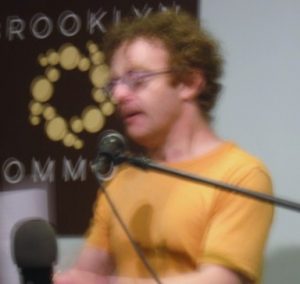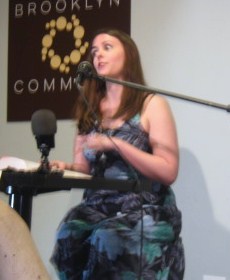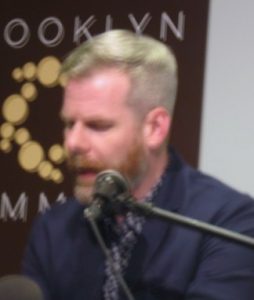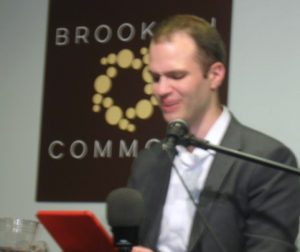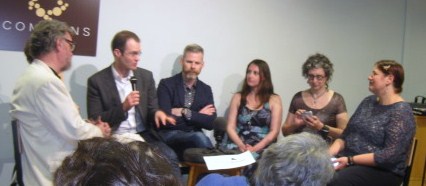
L to R: Joel Derfner, Michael Swanwick, Max Gladstone, Matthew Cody, Lindsay Smith, Ellen Kushner, Amy Goldschlager.
By Mark L. Blackman: On the spring evening of Tuesday, May 2, the New York Review of Science Fiction Readings Series, in a special event, showcased Serial Box, a publisher of serialized fiction in text and audio delivered in weekly episodes; it currently runs five ongoing series. In this innovative – or perhaps retrograde – publishing platform, as with television, the serials are collaboratively written by author teams. Representing four of the serials, and reading from their projects, were authors Michael Swanwick, Max Gladstone, Lindsay Smith, Matthew Cody, and Joel Derfner. (Ellen Kushner participated in the events, though did not read.) The stories were as diverse as the “writers rooms,” touching upon Urban Fantasy, Mannerpunk, Magical Espionage, and Young Adult Science Fiction.
Welcoming the audience to the Series’ venue, the Brooklyn Commons in transit-accessible Brooklyn, executive curator Jim Freund, host of WBAI-FM’s Hour of the Wolf radio program on sf and fantasy, shared the sad news of the death of Ama Patterson, who had been an integral part of Andrea Hairston’s performance at the Series. He thanked members of his own team, hinted at a possible special event later in the month, and announced that the 26th Season would likely close on Tuesday, June 6 with readings by Sam J. Miller and Lara Elena Donnelly. He then turned the stage over to the evening’s guest host/guest curator (and curator emerita) Amy Goldschlager.
Amy Goldschlager, an editor, proofreader and book/audiobook reviewer, related that serialized fiction began in the 19th century (notably with Dickens), and shared worlds with Thieves World and Wild Cards; Serial Box, she saw as “a wonderful confluence of it all.” With that, she introduced the first reader of the night, Joel Derfner, representing the Mannerpunk Tremontaine.
Joel Derfner is the author of Gay Haiku, Swish: My Quest to Become the Gayest Person Ever and What Ended Up Happening Instead, and Lawfully Wedded Husband: How My Gay Marriage Will Save the American Family. (Indeed, he does live, “alas, in Brooklyn, along with his husband and their small, fluffy dog.” He never did explain that “alas,” however.) His selection, from the prequel to – set 15 years before – Swordspoint, and preceding the writing of On the Causes of Nature (which figures in that novel), was characterized by Goldschlager as a “delightfully snarky bit of foreshadowing,” and contained many double entendres – intentional and not – about sausages. (His sex scenes, he said, were too long.)
Next to read was Lindsay Smith, who offered a scene from the “urban fantasy Cold War thriller” (Goldschlager) The Witch Who Came in From the Cold. There are, Smith explained, two factions of witches, the Fire and the Ice (so “the Cold” is not just the Cold War), fighting a war (here in 1970s Prague) alongside the one with American, British and Soviet spies.
Like Smith, Matthew Cody is a YA author; his published works include the award-winning Powerless and the Supers of Noble’s Green series, the Robin Hood re-imagining Will in Scarlet, and his current series The Secrets of the Pied Piper. His Serial Box series, ReMade, is about resurrected teens who are kidnapped and sent to the future; the action takes place in the future and in flashbacks (the present), and the scene that he chose was one of the latter. The boy, Holden (yes, named after you-know-who), who played a fairy (the only boy one) with no lines in A Midsummer Night’s Dream, nervously offers a ride to the cast party to its star (Titania), which does not end as he might have hoped.
During the intermission, a raffle drawing was held for donors in the audience, and two won a season of the Serial Box serial of their choice.
Max Gladstone, co-creator of The Witch Who Came in From the Cold and creator of Bookburners, describes himself as having “been thrown from a horse in Mongolia, drunk almond milk with monks on Wudang Shan, and wrecked a bicycle in Angkor Wat.” He is also the author of the Craft Sequence of books about undead gods and skeletal law wizards, Full Fathom Five, Three Parts Dead, Two Serpents Rise, Last First Snow., and the forthcoming Ruin of Angels (which doesn’t have a number in the title!). Bookburners is, he explained, a “supernatural procedural” about secret agents from the Vatican who pursue demons and black magic. For his reading, he offered the audience a choice between the first season and a preview of the third, which is launching in June, and the latter won out (the vote was not “rigged”). (What happened in Belfast?)
Back on stage, Goldschlager said that she and Freund had asserted that there can’t be a NYRSF Readings season without a reading by Michael Swanwick, and he writes for Serial Box. Swanwick has written nine novels – the latest of which is Chasing the Phoenix – 150 short stories, and countless flash fictions, and has received the Nebula, Theodore Sturgeon, World Fantasy and Hugo Awards. He returned us to The Witch Who Came in From the Cold, prefacing his reading by noting that, as if there aren’t already too many characters in it, he had brought in two more, the Russian general Bitovsky and the Norwegian Magnus. (They must be spies – they’re meeting in “a spy bar.”)
There was a recess as the stage was reset with all of the readers – joined by Kushner – for an interview by Goldschlager. She opened by asking about the process of collaboration, which Gladstone called “a Frankenstein process.” There are a lot of story breakdowns. (As on tv, the editor/publisher equivalent is a “showrunner.”) Smith said that Witch is “more puzzle-piecey,” with people gravitating toward their own characters. Derfner disagreed, and jokingly called her a liar. There are a lot of personal meetings over Tremontaine. Gladstone noted his writers retreats. What struck him, said Swanwick, was how many times a story goes through the editorial process, somewhere between six and 123 (he cited a debate over whether it’s duct tape or duck tape – as in a film or tv show, there has to be consistency, or continuity). There is a “house voice.” Derfner said that he liked “having structure, and not having to make things up.” In Season 1, he said, he had trouble getting Diane’s (the Duchess Tremontaine) voice right and asked Kushner to revise him. She said that she was doing Joel doing herself; the process was “metaphysical” (I offered the word). They had to invent a new way of doing a narrative.
Cody said with his background in theater (he holds a Master’s Degree in Theater, with a focus on Shakespeare), he enjoyed the collaborative process. People would fight for their idea, but only up to a point. Alluding to ReMade, Goldschlager noted that we figure things out (that they’re in the future) before the characters do, and wondered about how “genre-savvy” the readers are, particularly in YA. Whatever the genre, replied Cody, soap opera is the “underpinning” of YA. Finally, she asked Gladstone if The Witch Who Came in From the Cold and Bookburners take place in the same universe. “Stay tuned,” he intoned, providing a perfect conclusion to the interviews.
In the Q&A that followed, an audience member asked how they select people to be “in their zone.” Gladstone looks for writers “who are going to jump on and run with it” and had a “willingness to speak the same language.” Kushner said that she had it easier, had the advantage of everyone being a Swordspoint fan, knowing and loving the Riverside books, and knowing that they can “play well with others.” The writers, she continued, “have to be flexible, open to their ideas being changed.” There are gay men in the story, and so she has “an actual gay man” writing episodes. His theatrical background also helps. (Derfner has, as his biography states, composed the score to musicals that “have played in New York, London, and various cities in between [going counterclockwise].”) Her Tremontaine team, she observed, was “queer or writers of color, or both.”
The next questioner asked if the long form was easier to play with than a shorter form. Gladstone said that it made it easier to “compartmentalize.” Smith said that they have to create an “atmosphere;” she can tell which writer wrote which episode, yet the story unifies and flows. The final questioner asked about how much work goes into the “Series Bible” (again, a tv term). Cody said that it gave “everyone a level playing field,” but, as Gladstone agreed, it changed quickly and almost immediately as everyone gave input.
The customary Jenna Felice Freebie Table returned and there were copies of Tremontaine offered for sale. The audience, which approached 70, included Melissa C. Beckman (the Readings’ “official photographer”), Richard Bowes, Rob Cameron, Lynn Cohen Koehler, Barbara Krasnoff (the House Manager and a Nebula Award nominee), John Kwok, Lissanne Lake, Marianne Porter, James Ryan, Terence Taylor (Tech Director), Paul Witcover, and Serial Box co-founders Molly Barton and Julian Yap. Throughout the course of the evening and afterward, members of the audience availed themselves of the Café’s fare.

